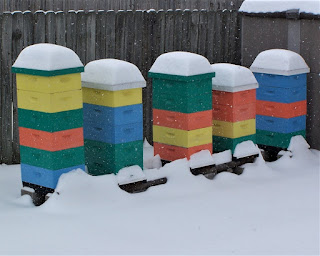Winter weather tests honey bee colonies and the beekeepers who set up the hives last fall. This year’s cold temperatures and heavy snow contrasted with recent years which saw mild temperatures and very little snowfall. Winds that normally swirl around the arctic, known as the polar vortex, took a dip deep into the South. Southern states recorded the coldest temperatures in years, and Arkansas and much of the South was blanketed with snow. Honey bees have the same requirements as humans: a warm, dry house, food, water, and an environment free of toxins. When beekeepers set up their hives for the winter, they make sure that the bees have plenty of food, placed where the bees can access it. Especially in the winter, bee hives must have adequate ventilation; hives must be able to vent considerable amounts of water vapor. Honey bee respiration produces water vapor, and water from condensation dripping in the hive can kill bees. With air entering bee hives through screened bottom boards or hive entrances, a small vent in the inner cover allows moist air to escape. Snow covering the entrances is porous and should allow air to enter the hives; however, bees must wait for a snow melt or the beekeeper’s clearing of hive entrances to make cleansing flights.
Bee hives are by design resistant to winter weather. Cold
winds are dampened by parallel sheets of honeycomb, and empty comb cells hold
dead air, providing natural insulation. In the South, wrapping of hives and
closing screened bottom boards is generally unnecessary. New beekeepers learn
the necessary hive preparation techniques from seasoned beekeepers in their
area. Regardless of the beekeeper’s care in setting up hives for winter, there
are often some colony losses. The majority of these losses are due to
starvation. Bees are capable at regulating temperatures in the hive, but starvation
often results from small wintertime bee clusters not being able to move about
the hive in extended cold weather to access stored honey.





No comments:
Post a Comment